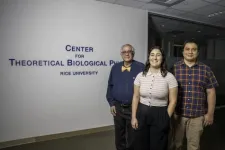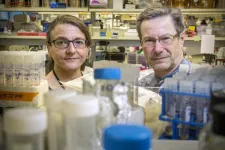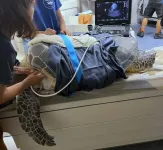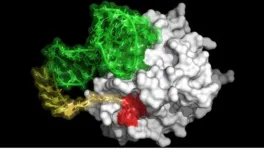(Press-News.org) Today, there are dozens of large language model (LLM) chatbots aimed at mental health care — addressing everything from loneliness among seniors to anxiety and depression in teens.
But the efficacy of these apps is unclear. Even more unclear is how well these apps work in supporting specific, marginalized groups like LGBTQ+ communities.
A team of researchers from the Harvard John A. Paulson School of Engineering and Applied Sciences, Emory University, Vanderbilt University and the University of California Irvine, found that while large language models can offer fast, on-demand support, they frequently fail to grasp the specific challenges that many members of the LGBTQ+ community face.
That failure could lead the chatbot to give at best unhelpful and at worst dangerous advice.
The paper is being presented this week at the ACM (Association of Computing Machinery) conference on Human Factors in Computing System in Honolulu, Hawaiʻi.
The researchers interviewed 31 participants — 18 identifying as LGBTQ+ and 13 as non-LGBTQ+ — about their usage of LLM-based chatbots for mental health support and how the chatbots supported their individual needs.
On one hand, many participants reported that the chatbots offered a sense of solidarity and a safe space to explore and express their identities. Some used the chatbots for practice coming out to friends and family, others to practice asking someone out for the first time.
But many of the participants also noted the programs’ shortfalls.
One participant wrote, “I don’t think I remember any time that it gave me a solution. It will just be like empathetic. Or maybe, if I would tell it that I’m upset with someone being homophobic. It will suggest, maybe talking to that person. But most of the time it just be like, ‘I’m sorry that happened to you.’”
“The boilerplate nature of the chatbots’ responses highlights their failure to recognize the complex and nuanced LGBTQ+ identities and experiences, making the chatbots’ suggestions feel emotionally disengaged,” said Zilin Ma, a PhD student at SEAS and co-first author of the paper.
Because these chatbots tend to be sycophantic, said Ma, they’re actually very bad at simulating hostility, which makes them ill-suited to practice potentially fraught conversations like coming out.
They also gave some participants staggeringly bad advice — telling one person to quit their job after experiencing workplace homophobia, without considering their financial or personal consequences.
Ma, who is in the lab of Krzysztof Gajos, the Gordon McKay Professor of Computer Science, stressed that while there are ways to improve these programs, it is not a panacea.
“There are ways we could improve these limitations by fine tuning the LLMs for contexts relevant to LGBTQ+ users or implementing context-sensitive guardrails or regularly updating feedback loops, but we wonder if this tendency to implement technology at every aspect of social problem is the right approach,” said Ma. “We can optimize all these LLMs all we want but there are aspects of LGBTQ+ mental health that cannot be solved with LLM chatbots — such as discrimination, bullying, the stress of coming out or the lack of representation. For that, we need a holistic support system for LGBTQ+ people.”
One area where LLM chatbots could be useful is in the training of human counselors or online community moderators.
“Rather than having teens in crisis talk to the chatbot directly, you could use the chatbot to train counselors,” said Ma. “Then you have a real human to talk to, but it empowers the counselors with technology, which is a socio-technical solution which I think works well in this case.”
“Research in public health suggests that interventions that directly target the affected individuals – like the chatbots for improving individual well-being – risk leaving the most vulnerable people behind,” said Gajos. “It is harder but potentially more impactful to change the communities themselves through training counselors or online community moderators.”
The research was co-authored by Yiyang Mei, Yinru Long, Zhaoyuan “Nick” Su and Gajos.
END
Coming out to a chatbot?
Researchers explore the limitations of mental health chatbots in LGBTQ+ communities
2024-05-13
ELSE PRESS RELEASES FROM THIS DATE:
Persistent strain of cholera defends itself against forces of change, scientists find
2024-05-13
A deadly strain of cholera bacteria that emerged in Indonesia back in 1961 continues to spread widely to this day, claiming thousands of lives around the world every year, sickening millions — and, with its persistence, baffling scientists. Finally, in a study published today in Nature, researchers from The University of Texas at Austin have discovered how this dangerous strain has held out over decades.
A longstanding mystery about the strain of Vibrio cholerae (V. cholerae) responsible for the seventh global cholera pandemic is how this lineage has managed ...
Rice study reveals insights into protein evolution
2024-05-13
Rice University’s Peter Wolynes and his research team have unveiled a breakthrough in understanding how specific genetic sequences, known as pseudogenes, evolve. Their paper was published May 13 by the Proceedings of the National Academy of Sciences of the United States of America Journal.
Led by Wolynes, the D.R. Bullard-Welch Foundation Professor of Science, professor of chemistry, biosciences and physics and astronomy and co-director of the Center for Theoretical Biological Physics (CTBP), the team focused on deciphering the complex energy landscapes of de-evolved, putative protein sequences corresponding to pseudogenes.
Pseudogenes are ...
Low testosterone in men associated with higher risk for death
2024-05-13
Embargoed for release until 5:00 p.m. ET on Monday 13 May 2024
Annals of Internal Medicine Tip Sheet
@Annalsofim
Below please find summaries of new articles that will be published in the next issue of Annals of Internal Medicine. The summaries are not intended to substitute for the full articles as a source of information. This information is under strict embargo and by taking it into possession, media representatives are committing to the terms of the embargo not ...
Chatbots tell people what they want to hear
2024-05-13
Chatbots share limited information, reinforce ideologies, and, as a result, can lead to more polarized thinking when it comes to controversial issues, according to new Johns Hopkins University–led research.
The study challenges perceptions that chatbots are impartial and provides insight into how using conversational search systems could widen the public divide on hot-button issues and leave people vulnerable to manipulation.
“Because people are reading a summary paragraph generated by AI, they think they’re getting unbiased, fact-based answers,” said lead author Ziang Xiao, an assistant professor of computer ...
Herpes cure with gene editing makes progress in laboratory studies
2024-05-13
SEATTLE — May 13, 2024 — Researchers at Fred Hutch Cancer Center have found in pre-clinical studies that an experimental gene therapy for genital and oral herpes removed 90% or more of the infection and suppressed how much virus can be released from an infected individual, which suggests that the therapy would also reduce the spread of the virus.
“Herpes is very sneaky. It hides out among nerve cells and then reawakens and causes painful skin blisters,” said Keith Jerome, MD, PhD, professor ...
Catch and release can give sea turtles the bends #ASA186
2024-05-13
OTTAWA, Ontario, May 13, 2024 – Six out of seven sea turtle species are endangered, and humans are primarily responsible. Commercial fishing activities are the largest human-caused disturbance to sea turtles due to accidental capture.
Fishers are typically unaware if a sea turtle is caught in their net until it’s completely pulled out of the water. However, releasing sea turtles without veterinary evaluations can be harmful. When accidentally caught, the turtles’ normal diving processes are interrupted, ...
Researchers unveil unique tidal disruption event with unprecedented early optical bump
2024-05-13
A research team from the University of Science and Technology of China (USTC) of the Chinese Academy of Sciences (CAS) presented a detailed analysis of a tidal disruption event (TDE) with unique characteristics, providing new insights into the behavior of TDEs and their multiwavelength emissions. The study was published online in The Astrophysical Journal Letters.
When a star ventures too close to a supermassive black hole at the center of a galaxy, it gets torn apart by the black hole's immense tidal forces, resulting ...
Researchers discover "topological hall effect" in two-dimensional quantum magnets
2024-05-13
In a recent study published in Nature Physics, researchers from the Hefei Institutes of Physical Science of the Chinese Academy of Sciences, together with researchers of University of Science and Technology of China, have introduced the concept of the "Topological Kerr Effect" by using the low-temperature magnetic field microscopy system and the magnetic force microscopy imaging system supported by the steady-state high magnetic field experimental facility.
The study holds great promise for advancing our understanding of topological magnetic ...
Like dad and like mum…all in one plant
2024-05-13
In a new study, led by Charles Underwood from the Max Planck Institute for Plant Breeding Research (MPIPZ) in Cologne, Germany, scientists established a system to generate clonal sex cells in tomato plants and used them to design the genomes of offspring. The fertilization of a clonal egg from one parent by a clonal sperm from another parent led to plants containing the complete genetic information of both parents. The study is now published in Nature Genetics.
Hybrid seeds, combining two different parent lines with specific favorable traits, are popular in agriculture as they give rise to robust crops with enhanced productivity, and have been utilized by farmers ...
New molecule mimics the anti-clotting action of blood-sucking organisms
2024-05-13
DURHAM, N.C. – Nature gave ticks, mosquitos and leaches a quick-acting way to keep blood from clotting while they extract their meal from a host.
Now the key to that method has been harnessed by a team of Duke researchers as a potential anti-clotting agent that could be used as an alternative to heparin during angioplasty, dialysis care, surgeries and other procedures.
Publishing in the journal Nature Communications, the researchers describe a synthetic molecule that mimics the effects of compounds in the saliva of blood-sucking critters. Importantly, the new molecule can also ...
LAST 30 PRESS RELEASES:
ASU researchers to lead AAAS panel on water insecurity in the United States
ASU professor Anne Stone to present at AAAS Conference in Phoenix on ancient origins of modern disease
Proposals for exploring viruses and skin as the next experimental quantum frontiers share US$30,000 science award
ASU researchers showcase scalable tech solutions for older adults living alone with cognitive decline at AAAS 2026
Scientists identify smooth regional trends in fruit fly survival strategies
Antipathy toward snakes? Your parents likely talked you into that at an early age
Sylvester Cancer Tip Sheet for Feb. 2026
Online exposure to medical misinformation concentrated among older adults
Telehealth improves access to genetic services for adult survivors of childhood cancers
Outdated mortality benchmarks risk missing early signs of famine and delay recognizing mass starvation
Newly discovered bacterium converts carbon dioxide into chemicals using electricity
Flipping and reversing mini-proteins could improve disease treatment
Scientists reveal major hidden source of atmospheric nitrogen pollution in fragile lake basin
Biochar emerges as a powerful tool for soil carbon neutrality and climate mitigation
Tiny cell messengers show big promise for safer protein and gene delivery
AMS releases statement regarding the decision to rescind EPA’s 2009 Endangerment Finding
Parents’ alcohol and drug use influences their children’s consumption, research shows
Modular assembly of chiral nitrogen-bridged rings achieved by palladium-catalyzed diastereoselective and enantioselective cascade cyclization reactions
Promoting civic engagement
AMS Science Preview: Hurricane slowdown, school snow days
Deforestation in the Amazon raises the surface temperature by 3 °C during the dry season
Model more accurately maps the impact of frost on corn crops
How did humans develop sharp vision? Lab-grown retinas show likely answer
Sour grapes? Taste, experience of sour foods depends on individual consumer
At AAAS, professor Krystal Tsosie argues the future of science must be Indigenous-led
From the lab to the living room: Decoding Parkinson’s patients movements in the real world
Research advances in porous materials, as highlighted in the 2025 Nobel Prize in Chemistry
Sally C. Morton, executive vice president of ASU Knowledge Enterprise, presents a bold and practical framework for moving research from discovery to real-world impact
Biochemical parameters in patients with diabetic nephropathy versus individuals with diabetes alone, non-diabetic nephropathy, and healthy controls
Muscular strength and mortality in women ages 63 to 99
[Press-News.org] Coming out to a chatbot?Researchers explore the limitations of mental health chatbots in LGBTQ+ communities




